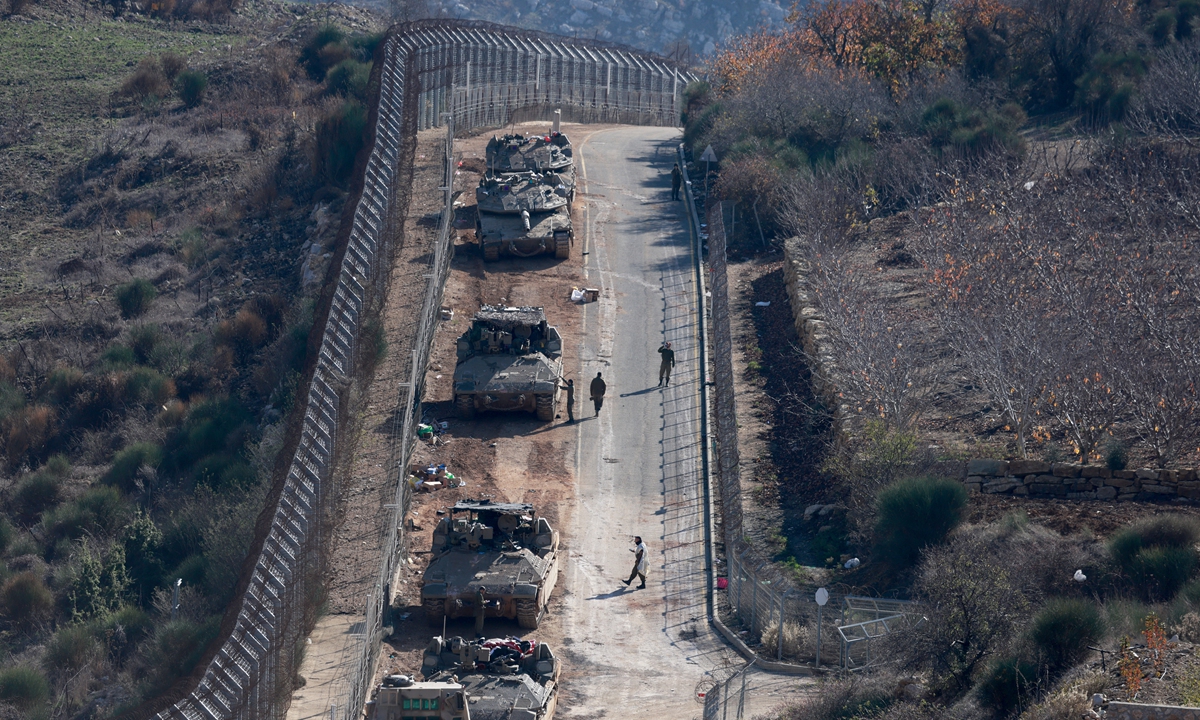
Israeli tanks and armored vehicles line up the area outside the Druze village of Majdal Shams on the fence with the buffer zone that separates the Israeli-annexed Golan Heights from the rest of Syria on December 9, 2024. Photo: AFP
The future of Syria should be decided by the Syrian people, the Chinese Foreign Ministry spokesperson Mao Ning said on Monday, adding that we hope relevant parties will find a political settlement to restore stability and order in Syria for the long-term and fundamental interest of the Syrian people.
China is closely following the situation in Syria, Mao said in response to a question that Syrian President Bashar al-Assad's ruling has ended and a new government is about to be established and how China views the current situation in Syria and whether it will establish contact with the new government.
Armed opposition forces took full control of Damascus on Sunday with the swift collapse of President Bashar al-Assad's government. Russian state media said on Sunday that Assad had landed in Moscow, and was granted asylum along with his family, according to the Xinhua News Agency.
The decision to grant political asylum to Bashar al-Assad and his family was made by Russian President Vladimir Putin, the press secretary of the Russian leader, Dmitry Peskov, told reporters, Tass reported.
The Kremlin said it is too early to determine the future of Russia's military bases in Khmeimim and Tartus, Syria. Peskov stressed that discussions about the bases will depend on the new leaders of Syria, RT reported.
Currently, we are witnessing a period of transformation and extreme instability, Peskov told journalists on Monday. He noted that the recent developments in Syria have surprised the world, including Russia. It will take time before we can engage in serious conversations with those who hold power.
The UN Security Council planned to hold emergency closed consultations on Syria later on Monday at Russia's request, the Associated Press reported. It also noted that Syria's neighbors have stepped up security along their borders. Lebanon said it was closing all but one of its land border crossings with Syria. Jordan also closed a border crossing.
Israel seized territory in Syrian-controlled areas of the Golan Heights, while warning Syrians living in five villages close to the Israeli-occupied portion of the area to stay home, Al Jazeera reported.
Speaking at the White House on Sunday, US President Joe Biden called the end of Assad's ruling in Syria a moment of risk and historic opportunity while offering a blueprint for how the US plans to support the region. He also announced the US had conducted dozens of airstrikes in Syria as it remains committed to preventing the resurgence of ISIS, according to CNN.
Hours after opposition forces seized Damascus and declared an end to the rule of Assad, Turkish Foreign Minister Hakan Fidan said at the Doha Forum on Sunday that all minorities in Syria should be treated equally and it is time to unite and reconstruct the country.
Who is the biggest benefactor?
Syria's post-war political reconstruction is at a crossroads. Moreover, tensions between Sunnis, Alawites, and Kurds could lead to a great uncertainty to Syria's future political structure, Sun Degang, director of the Center for Middle Eastern Studies at Fudan University, told the Global Times on Monday.
Although the opposition swiftly toppled the Assad government, establishing a power structure that all parties can accept will be a formidable challenge. In the future, they will face a prolonged and complex negotiation process. Achieving consensus will require extensive dialogue and maneuvering, influenced by the interventions of external powers, Wen Shaobiao, an expert from the Shanghai International Studies University, told the Global Times.
Syria currently hosts several major factions, each with its own stronghold, raising the possibility of de facto division, Ding Long, a professor with the Middle East Studies Institute of Shanghai International Studies University, told the Global Times.
The forces led by the Hayat Tahrir al-Sham (HTS), which has advanced into the capital and now control the Idlib region in western Syria, have expanded their influence through the establishment of the Syrian Salvation Government. The Syrian National Army, a force closely aligned with Turkey, primarily operates in northwestern Syria and along the Syria-Turkey border. The Syrian Democratic Forces (SDF), a Kurdish-led coalition of US-backed ethnic militias and rebel groups, is active in northeastern Syria. And there's the Alawite community, which is loyal to President Assad, said Ding.
Apart from the Alawite faction, which is likely to lose its political influence, conflicts are highly probable between the other groups. In particular, clashes between the Kurdish forces - viewed by Turkey as a security threat - and the other factions are almost inevitable. Syria may be heading toward a 'civil war 2.0,' with a strong likelihood of triggering a new refugee crisis, said Ding.
Many believe that in the post-Assad era, Turkey, along with the HTS and the Syrian National Army, will likely play a key role in reshaping Syria's political landscape, said Ding. However, the ideological differences between Turkey and the HTS are substantial, and their alliance is driven by short-term interests.
Moreover, as Turkey's influence in Syria rises, Iran's influence in Syria and the region has noticeably declined. The Iran-led Axis of Resistance has been severed and is even at risk of disintegration, Ding said.
On the other hand, the US views Syria as a proxy battleground with several main interests, including defeating ISIS, weakening Russia's influence, and curbing Iran's political and military presence. Regardless of whether the Trump or Biden administration is in power, the core objective remains to prevent the rise of anti-American forces and the US will not abandon its interests in Syria. Thus, it is likely to continue influencing Syria's political process under the pretext of counterterrorism, and promoting democratization in Syria, said Sun.
As for Russia, Moscow is currently pursuing a strategy of strategic withdrawal from Syria, but it will still seek to maintain influence in the country's future political reconstruction, preventing any one nation from monopolizing Syrian affairs, Sun noted.
Spillover effect
An opposition leader in Syria's Idlib province has been tasked with forming a new Syrian government, local media reported Monday.
Muhammad al-Bashir, born in 1983 and an electrical engineer and head of the Syrian Salvation Government (SSG) in Idlib under the aegis of the Hayat Tahrir al-Sham (HTS), will lead efforts to form a new cabinet following the rapid fall of President Bashar al-Assad's government on Sunday, online media outlet Sawt al-Asima reported.
The Syria situation in the post-Assad era could spill over and create new regional hotspots, exacerbating the Gaza crisis and the Iran issue, said Sun. Israel may adopt even more hardline measures toward both Gaza and Iran, which would further destabilize peace in the Middle East, Sun noted.
A statement from Israel's Defense Minister Israel Katz's office on Monday confirmed Israel's capture of the Syrian side of the strategic high point of Mt. Hermon. It also called for the completion of an Israeli takeover of the buffer zone in the Golan Heights, and the creation of a security zone in Syrian territory beyond it free of heavy strategic weapons and terrorist infrastructures, CNN reported on Monday.
It is possible that the situation in Syria may worsen with it becoming a battleground for great power competition, Sun said, noting that external powers should not treat Syria as their backyard and it should not become a theater for great power rivalry and division.
More international efforts are being called on to provide humanitarian aid, support post-war reconstruction, and push for internal reconciliation to prevent Syria from plunging into a cycle of conflict, said Sun.






